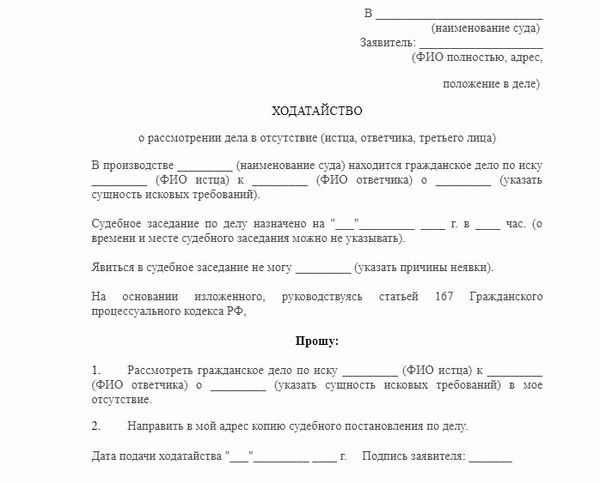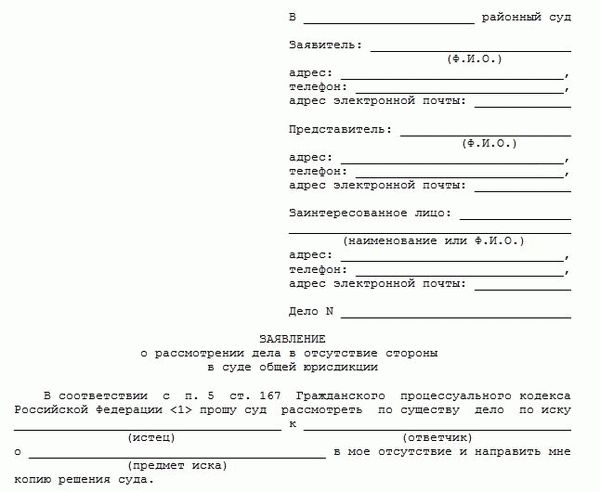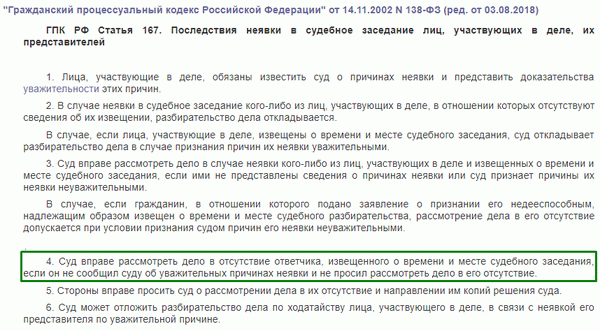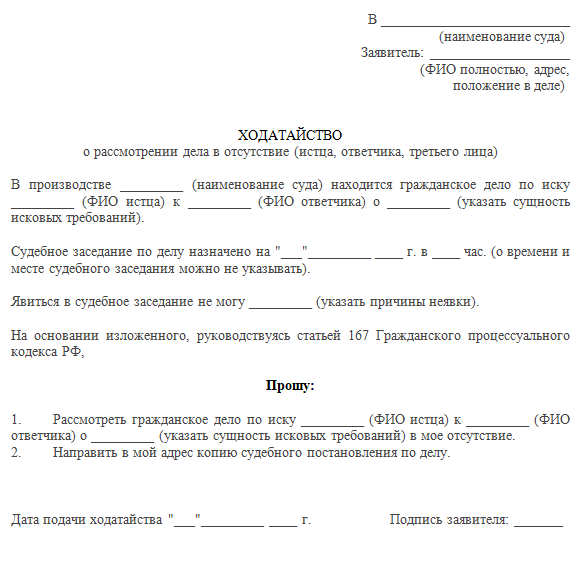When considering a court case, each of the parties may encounter circumstances that will not allow them to participate in the hearing. It may seem that in the absence of one of the parties, especially the defendant, it is not possible to deal with the claims of the plaintiff. However, current legislation allows the consideration of a case, subject to the filing of an appropriate petition to consider the case in the absence of the defendant or plaintiff.
Why you shouldn't miss meetings
First of all, if the defendant does not come to court hearings, this will delay the process, which may be disadvantageous for both parties.
Another unpleasant moment that a defendant may face is a fine. If the judge does not see the request to consider the case in the absence of the defendant, he may regard the failure to appear as contempt and impose a fine.
And the third option is to consider the claim without the participation of the defendant. In fact, this party will simply deprive itself of the right to protect its interests.
These three options will definitely not lead to the fact that the defendant will be able to defend himself and win the trial, at least partially. Moreover, filing an application to consider the case in the absence of the defendant confirms the seriousness of intentions and respect for the judge himself and the justice system in general.

Legal basis
According to the requirements of Article 167 of the Civil Procedure Code, the parties to the process do not have the right to refuse to participate in the process; they are obliged to report that they will be absent. In this case, the reasons for absence must be valid, for example:
- death of a loved one;
- disease;
- long business trip to another region or country, and so on.
Any justification must be documented.

Design rules
The Civil Procedure Code does not provide for a regulated form of a petition to consider a case in the absence of the defendant. However, practicing lawyers recommend adhering to the following structure of the document, based on the requirements of Article 131 of the Code of Civil Procedure:
- The “head” of the document or introductory part. As office work requirements state, this part of the document is located in the upper right corner. The “header” of the document indicates the details of the recipient, that is, the court, and the details of the defendant, that is, the applicant.
- Descriptive part. First, the title of the document is indicated: “Petition to consider the case in the absence of the defendant.” The date and case number are indicated under the title. Then a brief summary of the case is given, and who is the plaintiff and who is the defendant. The following paragraph lists the reasons for absence from the meeting.
- Resolution part. This part of the document proclaims the petition itself. You can indicate not only a specific date when it is not possible to be present in court, but also submit a request to consider the case without your participation.
At the end of the document, details of all documents that are attached to the application are written down. Then the date is affixed, a signature is placed and its decoding.
Sample petition for consideration of a case in the absence of the defendant (Civil Procedure Code, Article 167)
Details of the court case
This is interesting: Banks are loyal to bad credit history
The case is in progress…….….there is a claim…against the defendant….a brief description of the essence of the dispute…
The court hearing is scheduled for….date…time…, I was notified on time. However, I am not able to appear in the courtroom for the following reasons........
Based on the above and guided by article ... of the Code of Civil Procedure,
- Conduct a hearing on the claim...details..... without my presence.
- After drawing up the resolution, send me a copy to the address:….
Signature and full name applicant, date of preparation.

Petition to consider the case in the absence of the defendant
Citizens participating in court proceedings have every right not to appear at the hearing if there are compelling reasons for doing so. In accordance with the norms of the legislation of the Russian Federation, a person must provide a supporting document to the court - an application for consideration of the case in his absence.
We'll tell you how to prepare the document correctly.
The application must be submitted in writing .
No one will record a verbal request - and they will probably forget it, so all your words should be supported by documentation.
The application is written in free form , but you must follow the general rules for writing and filing applications to the court.
Assistance from a lawyer in drawing up a petition
We at the Legal Guarantee Law Office always say: the more thorough and professional the preparation for any trial, the higher the likelihood of a positive resolution of the issue for you.
It is better to trust the drafting of procedural documents - be it statements of claim, complaints, petitions - to those who have practical experience in protecting rights and interests in court.
Ideally, if you immediately contact a practicing lawyer - and, depending on the jurisdiction of your dispute - a representative lawyer in the courts of general jurisdiction or an arbitration lawyer.
Why?
At a minimum, this will save you time. It will also increase the chance of winning the argument.
In addition, you will receive advice on how to behave in court. Or consider the option of cooperating with a lawyer to protect legitimate interests - especially since only a person with a higher legal education can represent interests in an arbitration court.
If you need an application, fill out a simple form
Fill
By the way, in our “Documents” section you can download samples of statements of claim, complaints, petitions, applications, claims.
Author: Baldin Dmitry Aleksandrovich Director of Law Firm “Legal Guarantee”, Lawyer for bankruptcy and arbitration disputes Sign up for a consultation with lawyer Baldin D.A.
Petition for consideration of the case in the absence of the plaintiff
When considering civil cases, the court does not have the right to oblige citizens to personally attend and participate in the court hearing. A petition to consider a case in the absence of the plaintiff is usually made for the entire period of the court hearing of the case, but it is also possible for one court session. There are no mandatory requirements or conditions for drawing up a petition in the law. Below is a standard sample and example of a petition to consider a case in the absence of the plaintiff.
This is interesting: Fine for driving without a license after deprivation
Here:
Procedure for consideration of petitions in court
A court of general jurisdiction and an arbitration court consider petitions related to the consideration of the case (for example, to postpone the case, to involve a co-defendant, etc.) in a court hearing, listen to the opinions of other persons and make a decision based on the results of the consideration.
Other petitions (for deferment of payment of state fees, for restoration of the missed period for appeal, etc.) are resolved by the judge alone.
If your opponent in the dispute filed a petition, and you do not agree with him, state your reasoned objections.
An example of a request to consider a case in the absence of the plaintiff
To the Vologda City Court of the Vologda Region
Petition for consideration of the case in the absence of the plaintiff
In the proceedings of the Vologda City Court of the Vologda Region, civil case No. 3-758/2019 is pending in the lawsuit of O.S. Aleksandrov. to Konova V.A. about eviction from residential premises. In accordance with the court's ruling to accept the statement of claim, a preliminary hearing in this case is scheduled for March 21, 2022, and the main court hearing is scheduled for April 25, 2022. I will not be able to appear at the court hearing for purely personal reasons; I do not involve my representative. In connection with the above and guided by Article 167 of the Code of Civil Procedure of the Russian Federation,
Date 12/28/2021 Signature Alexandrov O.S.
How to make a petition?
Petitions may be made orally in court. In this case, make sure that they are recorded in the protocol. In addition, you can view the audio recording of the meeting and obtain a copy of it.
It is better to submit your request in writing, in which you can more clearly state your request and justify it. In order for the court to accept your petition, follow the following rules.
In the header you must indicate the name of the court to which you are sending the petition, details of the parties and the case number.
In the text of the petition, state the reasons why you are making a request to the court and the essence of your request.
For example:
Due to the fact that Petrov A.A. can confirm the fact that the plaintiff and defendant live together, please call A.A. Petrov, living at the address: Moscow, st. Novy Arbat, building XX, apt. XX, as a witness (in the case of establishing paternity)
Due to the fact that I am in the hospital with a serious illness and cannot take part in the hearing, I ask the court to postpone the hearing to XX.XX.XXXX
Refer in the text to Art. 41 of the Arbitration Procedure Code of the Russian Federation (when applying to an arbitration court), Art. 35 of the Code of Civil Procedure of the Russian Federation (when applying to a court of general jurisdiction), Art. 45 CAS RF (when applying to court as part of administrative proceedings). These rules provide for the general right of disputants to file motions. In addition, the right to petition on certain issues is also contained in other articles (for example, Article 88 of the APC - on calling a witness).
For example: Due to the fact that the claim was brought against the wrong person who should be responsible, and on the basis of Art. 41, part 1 art. 47 of the Arbitration Procedural Code of the Russian Federation, I apply for the replacement of an improper defendant with an appropriate one - Romashka LLC, TIN XXXXXXX, located at the address ... (petition to the arbitration court for the replacement of an improper defendant with an appropriate one)
Don't forget to sign the application, date it, and list the attached documents. Attach evidence of your arguments (for example, a certificate from a medical institution if you are unable to attend the meeting due to illness).
You have the right not to file a separate document, but to state your requests in a claim or complaint (if you are asking for something at the same time as filing a claim or appealing it).
Filing a petition to consider the case in the absence of the plaintiff to the court
It is simply necessary for the plaintiff to submit a petition, because... when considering the case and if the plaintiff fails to appear again, the court will not even consider the statement of claim. If the defendant fails to appear and does not request that the case be considered without him, the court will issue a default judgment. Failure of duly notified third parties to appear in the courtroom will not be grounds for temporary termination or suspension of the consideration of the case. If one of the participants in the case cannot be present, for a number of certain valid reasons, at the court hearing, but expresses a desire to participate in it, then she has the right to file a motion to postpone the court session.
What types of petitions are there? And in what situations can a petition be filed?
File a petition with the court in the following situations:
- you or your company have financial difficulties and you need a deferment in payment of state duty;
- you missed the deadline to appeal the court decision and ask the court to reinstate it;
- you consider it inappropriate to participate in court due to the remote location of the hearing and ask the court to consider the case without your personal presence or the presence of a company representative;
- or, conversely, for good reason you or your representative cannot participate in the hearing, but this is very important for you, and you ask to postpone the court hearing;
- you ask to postpone the court hearing, since it is possible to reach an agreement with the other party on concluding a settlement agreement;
- there was a need to appoint an examination (for example, to assess the cost of damage to a car as a result of an accident or to determine the quality and suitability of a construction project);
- you need to involve witnesses, third parties, co-defendants or specialists in the case, and also replace the improper defendant;
- you want to attach new documents to the case;
- you cannot obtain evidence yourself (for example, documents that are held by a notary, a registry office or other government agency, or from third parties) and you ask the court to request them;
- you are far from the place of the hearing and want to participate in it via video conference with the assistance of another arbitration court;
- you need to familiarize yourself with the case materials;
- you are afraid that by the time the writ of execution is received, the defendant will have gotten rid of the property or gone bankrupt, and you are asking for interim measures to be taken;
- you are a defendant and want to cancel or replace interim measures with others;
- you have resolved all your disagreements with the defendant and want to return the statement of claim or complaint;
- you need to obtain a writ of execution or a duplicate of the writ of execution, since the original is lost;
- As part of the case of bringing to administrative responsibility, you ask to replace the fine with a warning, to reduce the amount of the fine or to defer its payment.
Order a petition from a lawyer
The lawyers of Legal Guarantee Law Firm will draw up a petition to the court that fully complies with the requirements and will help you justify your position in court
Order a petition to the court
Resolution of the application
If a request is made to consider the case without the participation of the plaintiff, the court is obliged to take this statement into account and consider the case in the general manner. The court cannot force the plaintiff to appear in the courtroom. As for petitions from other third parties, the court decides directly at the court hearing - the reasons for the absence are clarified and the positions of the persons present participating in the case are considered. The court's decision to grant or deny the petition is not subject to appeal.
Legislative framework: grounds for absentee review
Any civil cases can be considered in absentia under one condition - the party did not come to court and did not provide evidence that the reason for the absence was valid (absence due to illness, business trip, etc.).

However, even in this case, consideration of the case in absentia is impossible if:
- the plaintiff does not agree with this;
- the plaintiff has changed the subject or grounds of the claim;
- the defendant did not come to the hearing, but notified the judge in advance and attached relevant documents to the application.

Notification of non-participation in the case is submitted in the form of a petition - a sample document is discussed below.
This is interesting: Article for the use of narcotic substances
How to submit a petition to the court?
Send written petitions so that you have evidence of sending them to the court:
- by mail with notification, preferably with a description of the attachment,
- through the court office (problematic during the period of restrictions due to coronavirus),
- through the “My Arbitrator” system to the arbitration court or through the GAS “Justice” system to the court of general jurisdiction.
Why is this necessary? The judge will not be able to accidentally “lose” your application, you will be able to appeal the refusal to satisfy your application, and you will also be able to once again petition the appellate court to call the same witnesses or to request the same evidence if you were denied at first instance.
Petition from the defendant
The structure of the document is standard - the following data must be reflected in the application:
- Name of the court.
- Full name of the applicant, his address and contact details, status in court (plaintiff, defendant or third party).
- Document's name.
- Description of the case, full names of the parties, subject of the claim.
- Description of the reason for absence.
- You can also separately indicate whether the defendant admits the claims or not: however, this point is not mandatory.
- The pleading part is to hold the hearing in absentia and send a copy of the court decision.
- Date of compilation and signature of the applicant with transcript (last name, initials).
When drawing up a document, you can use this example as a guide.

Petition from the plaintiff
On the other hand, if the defendant fails to appear, the case begins to drag on, which is disadvantageous for the plaintiff. Many citizens begin to clearly abuse the situation, based on the fact that by not appearing they gain time, demotivate the plaintiff, can find additional evidence in their favor, etc. There are also frequent cases when defendants believe that without them the court will still not be able to make a decision, which means that in this way they will be able to evade responsibility for quite a long time.
In such a situation, the plaintiff also has the right to file a petition, which has exactly the same structure as the document discussed above. The decision on the possibility/impossibility of holding a hearing in absentia can only be made by a judge, so the outcome is largely ambiguous. There are 2 options:
- The judge grants the motion, makes a decision, and sends a copy to the defendant. If the defendant does not appeal the decision within 1 month, it comes into force and enforcement proceedings begin - for example, seizure of accounts, transfer of property, etc. The deadlines may be violated, but for this the defendant must provide convincing evidence (for example, medical certificates of hospital treatment).
- The judge does not grant the petition, since without the testimony of the defendant, the case cannot be considered comprehensively and objectively. Then he instructs the bailiffs to find the citizen and ensure his arrest.
General provisions
A petition is understood as an official presentation or request that is sent to a judge from a participant in a dispute in order to perform any procedural actions or make a decision. It can be declared by:
- plaintiff;
- defendant;
- third parties;
- other participants - public organizations, government bodies, prosecutor, etc.;
- representatives, proxies of participants.
The most common requests in arbitration relate to evidence. It is on their basis that the court makes a decision, so the parties are interested in presenting to the hearing the most complete material that was obtained legally and confirms that they are right.
With the help of a petition in arbitration you can:
- Request documents and other evidence;
- Call a witness for questioning;
- Take interim measures (seize property);
- Postpone the consideration of the case;
- Apply for changes in claims;
- Ask to consider the dispute in the absence of the plaintiff;
- Assign an examination;
- Terminate the proceedings;
- Attach documents to materials;
- Oppose other parties' motions.
When filing a petition to request evidence, you must indicate exactly what circumstances they will confirm. The request is made in writing or orally. In the latter case, it is entered into the minutes of the court session. In addition, the petition may be submitted before the start of the court hearing. This can be done by sending it by mail in a valuable letter with a list of the attachments.
The court may refuse a spoken or written request if:
- It was submitted untimely;
- By these actions, the participant in the process clearly abuses the rights granted to him;
- There are signs of delays in the consideration of the case and obstacles to it.
It is possible to submit an application electronically. Consideration of such an appeal, whether oral, written or electronic, ends with the issuance of a determination.









